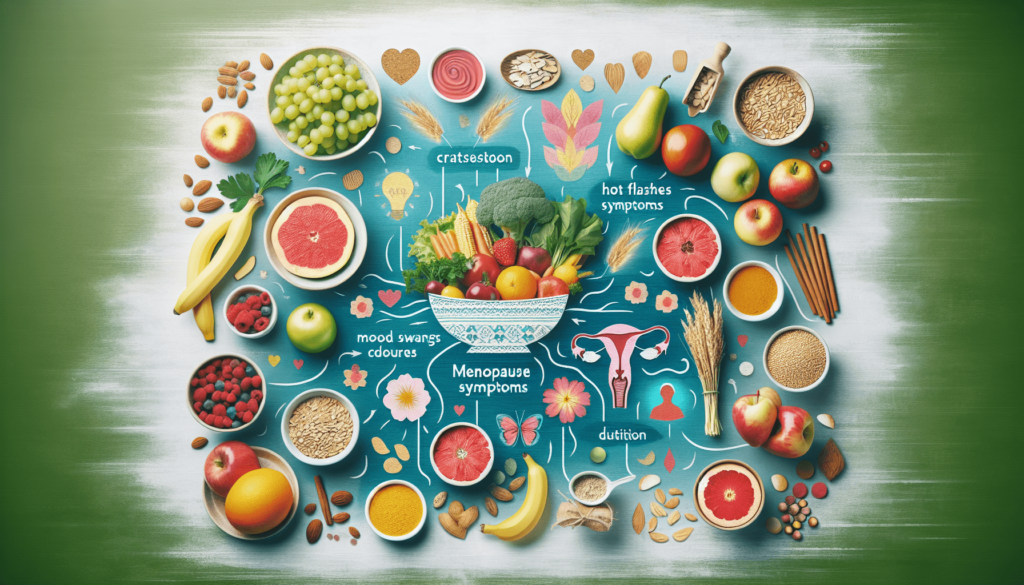Menopause is a natural phase that every woman experiences at some point in her life; however, the symptoms that accompany this transition can sometimes be challenging to navigate. From hot flashes and mood swings to weight gain and fatigue, the effects of menopause can be disruptive to daily life. But what if there was a way to ease these symptoms using something as simple as nutrition? In this article, we will explore how making dietary changes can help alleviate menopause symptoms and improve overall well-being during this transformative time. So, get ready to discover the power of nutrition in easing menopause symptoms and enhancing your quality of life.
1. Understanding Menopause
Definition of menopause
Menopause is a natural biological process that occurs in women usually between the ages of 45 and 55. It signifies the end of a woman’s reproductive years and marks the cessation of menstruation. Menopause is confirmed when a woman has gone 12 consecutive months without a menstrual period. During menopause, the production of hormones, namely estrogen and progesterone, declines significantly.
Common symptoms of menopause
Menopause is often associated with a range of symptoms that can vary in intensity and duration for each individual. Common symptoms include hot flashes, night sweats, mood swings, irritability, sleep disturbances, vaginal dryness, decreased libido, weight gain, and changes in hair and skin. These symptoms can greatly affect a woman’s quality of life and overall well-being.
Causes of menopause
Menopause is a biological process that occurs naturally as a woman ages. It is primarily caused by a decline in the production of hormones, specifically estrogen and progesterone, by the ovaries. As a result, the ovaries no longer release eggs and menstruation ceases. Other factors such as genetics, certain medical treatments like chemotherapy or radiation, and surgical removal of the ovaries can also induce menopause.
2. Importance of Nutrition During Menopause
Impact of nutrition on menopausal symptoms
Proper nutrition plays a crucial role in managing and alleviating menopausal symptoms. A well-balanced diet can help regulate hormone levels, reduce the frequency and intensity of hot flashes, and improve mood stability. Additionally, good nutrition can support bone health, cardiovascular health, and weight management, which are all important considerations during menopause.
Role of nutrition in maintaining overall health during menopause
Nutrition is not only vital for managing menopausal symptoms but also for maintaining overall health during this transitional phase. The hormonal changes that occur during menopause can increase the risk of certain health conditions such as osteoporosis and heart disease. By consuming a nutrient-rich diet, women can support bone health, cardiovascular function, and the overall well-being of their bodies.
Importance of maintaining a balanced diet
A balanced diet is crucial during menopause as it provides the necessary nutrients for overall health and symptom management. A well-balanced diet should consist of a variety of fruits, vegetables, whole grains, lean proteins, and healthy fats. By maintaining a balanced diet, women can ensure they receive essential nutrients needed to support their body’s functions and minimize the impact of menopausal symptoms.

3. Essential Nutrients for Menopause
Calcium
Calcium is an essential nutrient during menopause as it supports bone health and helps prevent osteoporosis, a common concern during this phase of life. Consuming adequate amounts of calcium-rich foods such as dairy products, leafy green vegetables, and fortified foods can help maintain bone density and reduce the risk of fractures.
Vitamin D
Vitamin D works in conjunction with calcium to support bone health. It aids in the absorption of calcium and plays a crucial role in maintaining strong bones. Spending time in the sun, consuming fatty fish like salmon or mackerel, and incorporating vitamin D-fortified foods into the diet can help ensure adequate vitamin D levels during menopause.
Omega-3 fatty acids
Omega-3 fatty acids have been shown to reduce inflammation, improve heart health, and support brain function. During menopause, incorporating foods rich in omega-3 fatty acids such as fatty fish, walnuts, and flaxseeds can help manage cardiovascular symptoms and promote overall well-being.
B vitamins
B vitamins, particularly vitamin B6, vitamin B12, and folate, are important nutrients during menopause. These vitamins play a significant role in maintaining energy levels, supporting a healthy nervous system, and regulating mood. Including foods such as whole grains, leafy green vegetables, eggs, and lean meats in the diet ensures an adequate intake of B vitamins.
4. Foods to Include in Menopausal Diet
Dairy products
Dairy products such as milk, yogurt, and cheese are excellent sources of calcium, which is essential for bone health during menopause. Opting for low-fat or non-fat dairy products can help minimize saturated fat intake and support cardiovascular health.
Leafy green vegetables
Leafy green vegetables like kale, spinach, and broccoli are rich in calcium, vitamin K, and other essential nutrients needed for bone health. These vegetables also provide antioxidants that can help reduce inflammation and support overall well-being.
Fatty fish
Fatty fish like salmon, sardines, and trout are excellent sources of omega-3 fatty acids, which can help manage cardiovascular symptoms and support brain health during menopause. Including fatty fish in the diet two to three times a week can provide the necessary omega-3 fatty acids.
Soy products
Soy products such as tofu, tempeh, and edamame contain phytoestrogens, which are plant compounds that mimic the effects of estrogen in the body. Phytoestrogens can help alleviate menopausal symptoms such as hot flashes and vaginal dryness. Incorporating soy products into the diet can be beneficial for women experiencing these symptoms.
Whole grains
Whole grains like whole wheat, brown rice, and quinoa are excellent sources of complex carbohydrates, fiber, and B vitamins. These nutrients provide sustained energy, promote gastrointestinal health, and support a healthy nervous system. Choosing whole grain options over refined grains can help stabilize blood sugar levels and manage weight during menopause.
Nuts and seeds
Nuts and seeds such as almonds, walnuts, chia seeds, and flaxseeds are rich in healthy fats, fiber, and various vitamins and minerals. They can help reduce inflammation, support heart health, and provide essential nutrients during menopause. Incorporating a handful of nuts and seeds into the diet as a snack or adding them to meals can be a convenient way to incorporate these beneficial foods.
Flaxseeds
Flaxseeds are particularly beneficial during menopause due to their high content of lignans, which are phytoestrogens. Lignans can help alleviate menopausal symptoms and support hormone balance. Adding ground flaxseeds to smoothies, yogurt, or baked goods can be an easy way to incorporate them into the daily diet.
Legumes
Legumes such as beans, lentils, and chickpeas are excellent sources of plant-based protein, fiber, and various nutrients. They can help support bone health, manage weight, and regulate blood sugar levels during menopause. Incorporating legumes into meals or snacks can provide a healthy and filling source of nutrition.
Water
Staying hydrated is crucial during menopause. Aim to drink at least 8 to 10 glasses of water per day to support overall health and well-being. Staying hydrated can help alleviate symptoms such as hot flashes and promote optimal bodily functions.

5. Tips for Incorporating Essential Nutrients in Diet
Meal planning
Planning meals in advance can help ensure a well-balanced and nutrient-rich diet. Consider including a variety of food groups such as fruits, vegetables, whole grains, lean proteins, and healthy fats in each meal. This ensures a diverse intake of essential nutrients.
Cooking methods
Opt for healthy cooking methods such as baking, grilling, steaming, or sautéing instead of frying or deep-frying. These methods help retain the nutritional value of foods while minimizing the use of added fats and oils.
Portion control
Pay attention to portion sizes to avoid overeating. Menopause can slow down metabolism, so it is important to be mindful of portion sizes to maintain a healthy weight. Use smaller plates or bowls and listen to your body’s hunger and fullness cues.
Including a variety of foods
Incorporating a variety of foods ensures a diverse nutrient intake. Try new recipes, experiment with different fruits and vegetables, and explore various cooking techniques to keep meals interesting and nutritious.
6. Foods to Avoid
Processed foods
Processed foods typically contain high amounts of unhealthy fats, sodium, and added sugars. These foods can contribute to weight gain, inflammation, and overall poor health. Avoiding or minimizing processed foods can help manage menopausal symptoms and support overall well-being.
Caffeine
Caffeine can exacerbate menopausal symptoms such as hot flashes and sleep disturbances. Limiting the consumption of caffeinated beverages like coffee, tea, and soda can help alleviate these symptoms. Opt for decaffeinated versions or herbal teas instead.
Alcohol
Alcohol can disrupt sleep patterns, trigger hot flashes, and have negative effects on bone health. It is recommended to limit alcohol consumption during menopause to support overall health and minimize symptom severity.
High-sodium foods
High-sodium foods can contribute to bloating, water retention, and high blood pressure. It is important to minimize the intake of processed and packaged foods that are typically high in sodium. Opt for fresh foods and herbs and spices to enhance flavor without added sodium.
Sugary foods and beverages
High-sugar foods and beverages can lead to weight gain, increase the risk of chronic diseases, and exacerbate mood swings. Minimizing the intake of sugary foods and opting for natural sweeteners such as fruits or honey can help manage menopausal symptoms and promote overall health.
Spicy foods
Spicy foods can trigger hot flashes and worsen night sweats for some women. It may be beneficial to avoid or limit the consumption of spicy foods during menopause to minimize symptom severity.
7. Herbal Remedies for Menopause Symptoms
Black cohosh
Black cohosh is a popular herbal remedy used to alleviate menopausal symptoms such as hot flashes, night sweats, and mood swings. It is believed to have estrogen-like effects in the body, helping to balance hormone levels. However, it is important to consult with a healthcare professional before taking any herbal supplements.
Red clover
Red clover contains phytoestrogens that can help manage menopausal symptoms. It is commonly used to alleviate hot flashes and improve vaginal dryness. As with any herbal remedy, it is important to discuss the use of red clover with a healthcare professional.
Sage
Sage has been traditionally used to reduce excessive sweating and hot flashes during menopause. It can be consumed as a tea or incorporated into meals for its potential benefits. However, it is recommended to use sage in moderation and under the guidance of a healthcare professional.
Dong quai
Dong quai is an herb commonly used in traditional Chinese medicine to alleviate menopausal symptoms. It is believed to have estrogen-like effects and may help reduce hot flashes and vaginal dryness. Consultation with a healthcare professional is essential before using dong quai.
Evening primrose oil
Evening primrose oil is rich in omega-6 fatty acids and is often used to manage symptoms such as hot flashes and mood swings. It is important to note that individual responses to evening primrose oil may vary, and it is recommended to consult with a healthcare professional before use.
Chasteberry
Chasteberry, also known as Vitex agnus-castus, is an herb commonly used to manage menstrual irregularities and premenstrual symptoms. It may also have potential benefits for menopausal symptoms such as mood swings and breast tenderness. It is advisable to consult with a healthcare professional before incorporating chasteberry into a menopausal regimen.
8. The Role of Phytoestrogens in Menopause
Definition of phytoestrogens
Phytoestrogens are plant compounds that have estrogen-like effects in the body. They can bind to estrogen receptors and exert both weak estrogenic and anti-estrogenic effects. Phytoestrogens have been studied for their potential benefits in managing menopausal symptoms due to their ability to mimic the effects of estrogen in the body.
Food sources of phytoestrogens
Phytoestrogens can be found in various foods including soy products, flaxseeds, sesame seeds, lentils, and whole grains. Incorporating these foods into the diet can provide a natural source of phytoestrogens and potentially alleviate menopausal symptoms.
Benefits and risks of consuming phytoestrogens
Consuming phytoestrogens may help manage menopausal symptoms such as hot flashes, mood swings, and vaginal dryness. They can also support overall health by potentially reducing the risk of heart disease and osteoporosis. However, it is important to note that individual responses to phytoestrogens may vary, and it is advisable to consult with a healthcare professional before making significant dietary changes.
9. Lifestyle Factors for Managing Menopause Symptoms
Regular physical activity
Engaging in regular physical activity can help manage menopausal symptoms by promoting overall well-being and reducing the risk of chronic diseases. Activities such as brisk walking, swimming, yoga, or strength training can help alleviate symptoms, improve mood, and support weight management.
Stress management
Stress can exacerbate menopausal symptoms and impact overall well-being. It is important to engage in stress-reducing activities such as meditation, deep breathing exercises, yoga, or hobbies that promote relaxation and self-care. Managing stress can positively influence menopause symptoms and improve overall quality of life.
Adequate sleep
Getting adequate sleep is crucial during menopause as sleep disturbances are common. Establishing a regular sleep routine, creating a comfortable sleep environment, and practicing good sleep hygiene can help improve sleep quality and reduce the frequency of night sweats and insomnia.
Maintaining a healthy weight
Menopause can bring about hormonal changes that influence weight gain and body composition. Maintaining a healthy weight through a balanced diet and regular exercise can help manage menopausal symptoms and reduce the risk of chronic conditions such as heart disease and diabetes.
Limiting smoking and alcohol consumption
Smoking and excessive alcohol consumption can worsen menopausal symptoms and increase the risk of numerous health problems. Quitting smoking and consuming alcohol in moderation or abstaining from it can have positive impacts on overall health and well-being during menopause.
10. Seeking Professional Guidance
Consultation with a healthcare professional
Menopause is a unique experience for each woman, and seeking professional guidance from a healthcare provider is essential. A healthcare professional can provide an accurate diagnosis, offer personalized advice, and recommend appropriate treatment options or hormone therapies if necessary.
Working with a registered dietitian or nutritionist
A registered dietitian or nutritionist can provide expert guidance on an individual’s dietary needs, including nutrient requirements during menopause. They can help develop a personalized meal plan, address specific concerns, and ensure optimal nutrition and symptom management during this transitional phase.
By understanding menopause, recognizing the importance of nutrition, incorporating essential nutrients into the diet, avoiding certain foods, exploring herbal remedies, considering phytoestrogens, adopting healthy lifestyle factors, and seeking professional guidance, women can effectively manage menopausal symptoms and support their overall well-being during this important life stage. Easing menopause symptoms with nutrition is an empowering way for women to take control of their health and navigate this natural biological process with grace and vitality.

